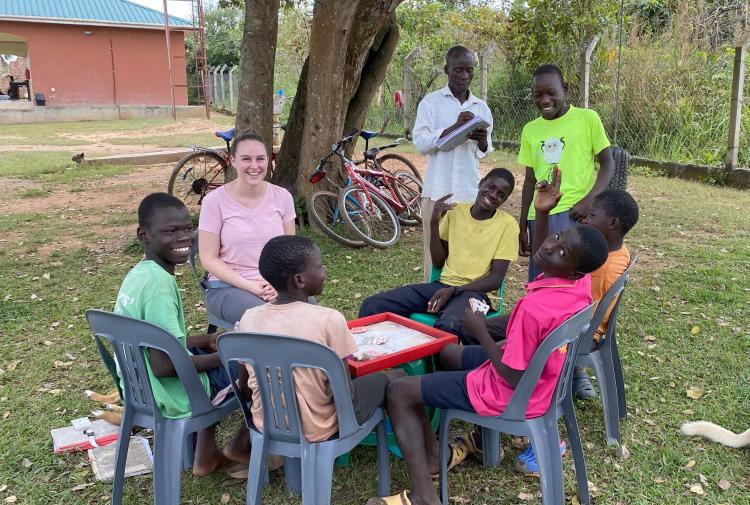Anne, a pregnant 21-year-old student in northern Uganda, was becoming increasingly withdrawn from her studies due to depression and anxiety.

KPU alum Amie Orsetti with youth in Uganda.
But a year later, thanks to an improvement in her mental health, she's running her own business. This was possible for Anne after participating in a Kwantlen Polytechnic University (KPU) led mental health project.
Since it was launched in 2022, the Wang Oo Relit project (WORP) has helped increase mental health resiliency and wellbeing for more than 200 Ugandan youth. The project has paved the way for programs that provide youth with the tools and resources to effectively manage conditions such as anxiety and depression.
With over 70% of Ugandan youth experiencing poor mental health largely related to war, violence and displacement in the region the project has filled a much-needed gap.
"The war has really left the region impoverished, and there are high unemployment rates among youth as a result," says KPU instructor Dr. Kyle Matsuba, who led the project. "There's also a lot of stigma and lack of awareness around mental health, so youth don't have as much access to resources or support."
A strong gender division means female students face additional pressures, including domestic responsibilities. Abuse and neglect are also higher among female students, with 95% experiencing some form of abuse by the time they graduate high school.
With funding from Grand Challenges Canada, Matsuba developed a culturally-based mental health program in northern Uganda to help youth better cope with these challenges. This involved training Ugandan youth to become mental health youth workers who can subsequently support their peers.
"We wanted to take a 'by youth, for youth' approach, so that the youth leaders can develop their own WORP programs and educate and empower their peers," says Matsuba. "We trained the youth leaders on mindfulness, social emotional learning skills, and how to recognize and deal with stress."
KPU students were involved in developing training lessons and materials, with one student even travelling to Uganda to lead a workshop.
Progress was monitored through interviews and surveys, which assessed the youths' well-being, resilience, emotional stability and emotional support. The youth demonstrated a significant improvement on each of these measures, along with a decrease in anxiety, depression and perceived stress.
Youth who were waitlisted for the programs were monitored as well, acting as a control group. When assessed on the same measures, the waitlist showed no improvement, further pointing to the program's effectiveness.
"This impactful work by Dr. Matsuba, his students, colleagues and partners exemplifies KPU's commitment to be a community-engaged university. It furthers sustainable development goals and showcases how thoughtful international collaborations can help build lasting capacity," says Dr. Deepak Gupta, Associate Vice President, Research and Innovation at KPU.
Another devastating impact of the war was the loss of the wang oo, a traditional practice from which the project derives its name. Prior to the war, villages would gather around a bonfire at the end of the day, sharing stories and cultural wisdom. Wang oos abruptly ended since fires put villagers at risk from rebel invasions. Part of the project involved reintroducing this practice to the youth and their communities.
"During our programs, we held wang oo's where youth, elders and community members would come together to share knowledge around WORP themes of the week," says Matsuba. "Even though the programs are focused on youth, elders developed a sense of purpose in sharing this information and knowledge with the younger generation, who often knew very little about their traditional cultures."
Matsuba was invited to present his work to Members of Parliament in Ottawa earlier this week as part of a research showcase organized by Grand Challenges Canada.
"This research wouldn't have been possible without our funder, Grand Challenges Canada, community partnership with Children Care Uganda, and the continual support of KPU's Office of Research Services and the Provost's Office," he says.










